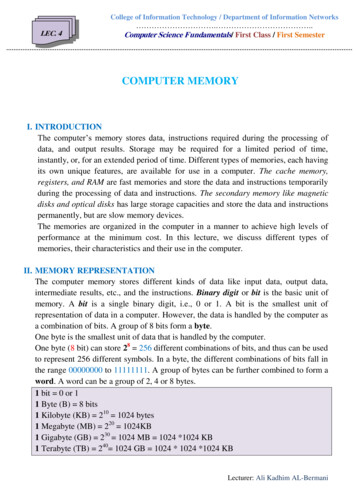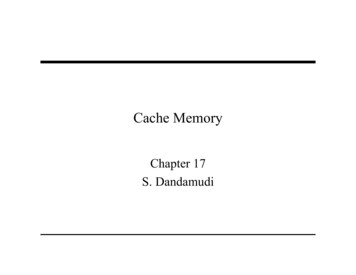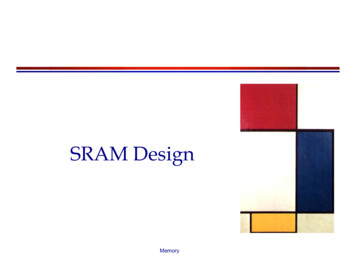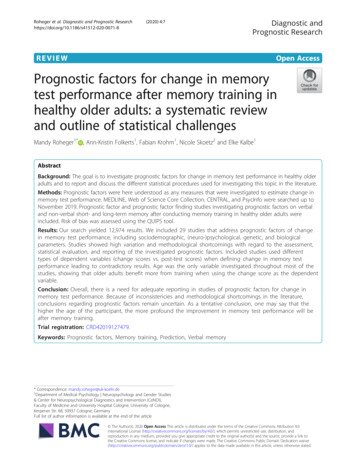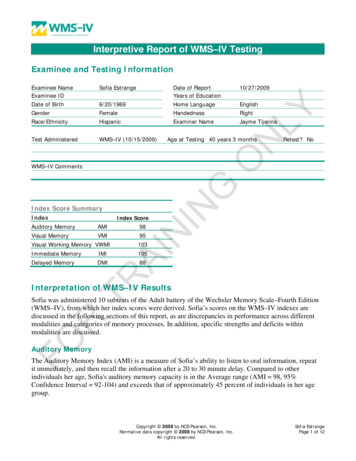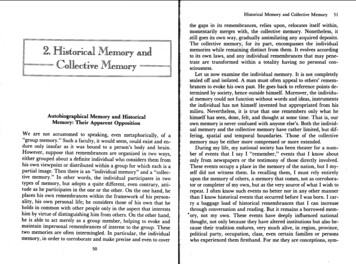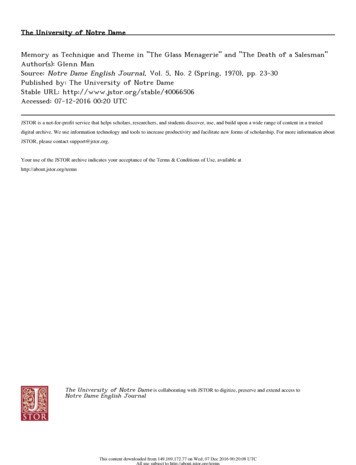
Transcription
Why mnemonic devices workOrganizationFactors that influenceMemoryChapter 8pp 257-270Groups information into smaller “chunks”Retrieval cuesProvide several memory codesVerbal and visual representationsVisual imagery: picture superiority effectElaborationThink about meaningNotice relationships and differencesGenerationYour ideas makes it personalLimitations of MnemonicsTimeHow to deal with abstract material?Learning vs. retentionCreative abilityInterference – more materialDoesn’t help memory in generalInfluencing factors on MemoryNeed to pay attention to rememberNo help if fail to use techniqueDoes not help understanding of materialNeed to practice mnemonics!Influencing factors on MemoryInfluencing factors on MemoryRetrieval cuesSerial positionBasic memory task:Learn list of words – break – memory testRetrieval cuesFree recallCued-recallRecognitionHow good is your memory for music lyrics?Rhyming techniqueOrganized/chunkingFree recall% correct for each wordSerial position curvePrimacyLong-Term MemoryRecencyShort-Term MemoryTwo independent systemsof memory1
Influencing factors on MemoryPrimacy and RecencyPortion of Serial Position CurveElaboration and MeaningMemory instructions for study conditionsShallow: Count # of vowels in words (physical)Deep: Synonym for words (meaning)Memory Test:Performance is significantly better for “deep” conditionEffect of elaborationSlow presentation morerehearsal better LTMConnection to existing knowledgeNotice similarities and differencesProvides cuesProvides distinct memory30s delay after listpresentation reduces STMState dependent learning(Encoding-retrieval match)Encoding-retrieval matchEncoding-retrieval matchEffective cueContext dependentHomophone studyTransfer-appropriateprocessingStudy in same wayyou are tested!Environment encodedwith TBR infoStudy on landStudy underwaterGrant et al. (1998)Why do we forget?Why do we forgetPeterson & Peterson (1959)Ebbinghaus (1850 – 1909)Proactive InterferenceTrigrams(Old info interferes with new info)CVG75% accuracyPercent savingsMemorized nonsensetrigrams in serial orderTested at various intervalsForgetting curveWhy?DecayRetroactive interferenceProactive InterferenceEich & Metcalfe (1989)70653s delay6055Delay before test50Block 1Block 2Block 3Block 412 trials/block2
Why do we forget?Begin to write only after I have given thesignal, “Go”.Retroactive interference(New info interferes with old info)List learning with 1, 2, 4, 8 hr delayIf awake during delay new info occurs before testIf asleep during delay no new info before WoodCushionHardRockingBenchMemory ReconstructionLoftus & Palmer (1974)Reconstructive memoryFilm of actual accidentRoediger & McDermott (1995)Reconstructmemories whenquestionedInfluence of generalknowledge: schemasSemantically similar listsOn 50% of lists have FALSE memory (e.g. “sleep”)WHY?Gist memorySchemaFamiliarityMemory reconstructionBartlett’s (1932) “The War of the Ghosts”Leading question:“About how fast were the carsgoing when they smashed intoeach other?”“Did you see broken glass?”Memoryconstruction3
Flashbulb (FB) memoryBrown & Kulick (1977)Memory of emotional and surprising eventsExamplesJFK assassinationSpace shuttle ChallengerSeptember 11thAre flashbulb memories (more/less) accurate?Where were you?What were you doing?How did you find out?How did you feel?Autobiographical memoryAutobiographical memoryPersonal life eventsMemory and EmotionEnhancement effect possibly due ine (?)Talarico & Rubin (2003): 9/11FB and normal memories: equal forgetting rateFB retain emotion and vividnessAutobiographical memory over LifespanRybash (1999)Recency effect: remember events just happenedReminiscence bump: remember events from 11 – 24 yrs oldFirst memoryAverage 3-5 years oldInverse relationship: Age 1st memory and intelligenceRecency effectReminiscence bumpInfantile amnesia: Why?Brain developmentSelf-conceptLanguageCommon Memory QuestionsWhy do some people remember better than others?Why are there differences in the things youremember well vs. forget?Does memory always decline with age?How can I improve my memory?Does sleep improve memory?Why is Alzheimer’s disease more common today?Review: Chapter 8 MemoryMnemonic devicesWhy mnemonics work and their limitationsTypes of memory: stm/ltm; explicit/implicit;episodic/semanticWhat we’ve learned about memory fromamnesia case studiesFactors that influence memoryWhy we forgetReconstructive memory and schemasAutobiographical memory; Flashbulb memory4
MemoryRepetitionRetrieval cuesDual-coding cuesVerbal and e relationships anddifferencesUse existing knowledgeGenerationYour ideas makes it personalAttentionEnsure encodingElaborationThink about meaningDeep vs shallow processingEncoding-retrieval matchTransfer appropriateprocessingSerial position curvePrimacy vs recencyDecay vs interferenceProactive vs retroactive5
Inverse relationship: Age 1st memory and intelligence Infantile amnesia: Why? Brain development Self-concept Language Autobiographical memory over Lifespan Rybash (1999) Recency effect: remember events just happened Reminiscence bump: remember events from 11 -24 yrs old Recency effect Reminiscence bump Common Memory Questions
